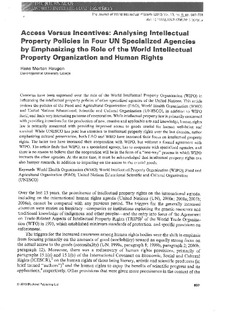Access Versus Incentives: Analysing Intellectual Property Policies in Four UN Specialized Agencies by Emphasizing the Role of the World Intellectual Property Organization and Human Rights
Journal article, Peer reviewed
Permanent lenke
http://hdl.handle.net/11250/98975Utgivelsesdato
2010Metadata
Vis full innførselSamlinger
- Artikler / Articles [1186]
Sammendrag
Concerns have been expressed over the role of WIPO in influencing the intellectual property policies of other specialized agencies of the United Nations. This article reviews the policies of FAO, WHO and UNESCO, in addition to WIPO itself, and finds very interesting patterns of cooperation. While intellectual property law is primarily concerned with providing incentives for the production of new, creative and applicable arts and knowledge, human rights law is primarily concerned with providing improved access to goods crucial for human well-being and survival. WIPO itself has expressed in some of its documents concerns of the issue of access, and has shown some understanding of human rights concerns in this regard. While UNESCO has paid less attention to intellectual property rights over the last decades, rather emphasizing cultural preservation, both FAO and WHO has increased their focus on intellectual property rights. The two latter increase their cooperation with WIPO, but without a formal agreement with WIPO. The article finds that WIPO, as a specialized agency, has to cooperate with specialized agencies, and there is no reason to believe that the cooperation will be in the form of a ‘one-way’ process in which WIPO instructs the other agencies. At the same time, if the emphasis on incentives in effect undermines the real access to the crucial goods, a new balance has to be found.
Utgiver
WernerTidsskrift
The Journal of World Intellectual PropertyBeslektede innførsler
Viser innførsler beslektet ved tittel, forfatter og emneord.
-
Three strategies of user participation. Interest organisation representatives' views on how they make an impact on service development.
Gathen, Jan Marius; Slettebø, Tor; Skjeggestad, Erik (Peer reviewed; Journal article, 2023)This paper explores user participation in interest organizations that repre-sent people in vulnerable life situations and addresses the following research question: How do interest organizations seek to influence public ... -
Being compassionate. Institutionalizing through values work in a faith-based organization
Espedal, Gry (Dissertation Series for the Degree of Philosophiae Doctor (Ph.D.) at VID Specialized University;no.16, Doctoral thesis, 2019)This study extends the emergent stream of values work by theorizing a process of value inquiry that links the facts of a situation with the ideals of institutional social engagement and the common good. The value inquiry ... -
Reactualized in times of crisis: The role of relatedness at work. A comparative study of a diaconal and a commercial organization
Løvaas, Beate Jelstad (Peer reviewed; Journal article, 2021)The Covid-19 pandemic has caused a switch to remote work and has given a boost to new digital technologies. These changes are altering the relational aspects of work and have had fundamental implications for workplace ...
